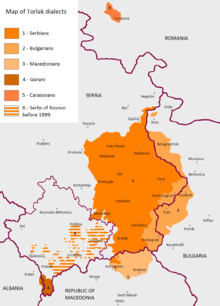Gora dialect
| Gorani language | |
|---|---|
| Našinski Jezik | |
| Native to | Kosovo, Albania |
Native speakers | 60,000 (2011 census) (date missing) |
|
Indo-European
| |
| Official status | |
Recognised minority language in | |
| Language codes | |
| ISO 639-3 | – |
| Glottolog | None |
|
Area where Torlakian dialects are spoken. Number 4 (in southern Kosovo) indicates the Gora dialect area. | |
| South Slavic languages and dialects | ||||||
|---|---|---|---|---|---|---|
|
Western South Slavic
|
||||||
|
Transitional dialects
|
||||||
|
Alphabets |
||||||
The Gorani or Našinski (literally meaning "our language") language is the variety of South Slavic spoken by the Gorani people in the border area between Kosovo, Albania, and Macedonia. It is part of the Torlakian dialect group,[1] which is transitional between Eastern and Western South Slavic languages.[2][3][4][5]
Distribution and classification
Spoken across the Gora region in 19 villages in Kosovo, 11 in Albania, and 2 in the Republic of Macedonia. In Kosovo and Macedonia, it is sometimes written in either the Serbian or Macedonian Cyrillic Alphabets, whereas in Albania, the Latin Albanian alphabet is used. In the 1991 Yugoslav census, 54.8% of the inhabitants of the Gora municipality said that they spoke the Gorani language, roughly in proportion to the number who considered themselves ethnic Gorani. In the same census, a little less than half of the inhabitants of Gora considered their language Serbian.[6]
Related to the neighbouring Torlak language varieties spoken in the Prizren–South Morava area to the northeast, also spoken in the southern half of Kosovo and in southeastern Serbia, as well as to the northernmost dialects of Macedonia. In relation to Macedonian dialectology, it is described as having particular close links to the Lower Polog dialect of the Polog and Tetovo regions,[7] which are situated just opposite the Gora area on the other side of the Šar Mountains.
Gorani has also been classified as a part of the Bulgarian dialect area, by Bulgarian[8] as well as some foreign anthropologists.[9] In 2007, the Bulgarian Academy of Sciences sponsored and printed the first Gorani–Albanian dictionary (with 43,000 words and phrases) by Goranian researcher Nazif Dokle, who considers the language a Bulgarian dialect.[10]
On the other hand, former Yugoslav linguists Vidoeski, Brozović and Ivić identify the Slavic dialect of the Gora region as Macedonian.[11] According to some sources, in 2003, the Kosovo government acquired Macedonian language and grammar books to be taught in Gorani schools.
Phonological characteristics
Gorani shares with standard Serbian, the northernmost dialects of Macedonian, and western dialects of Bulgarian, the vocalisation of earlier syllabic /l/ in words like vuk ('wolf') (cf. Macedonian volk, standard Bulgarian vǎlk). With Serbian it also shares the reflex of */tj, dj/ as /tɕ/, as opposed to standard Macedonian /c/ (⟨ќ⟩).[12] With the westernmost Macedonian varieties, as well as most of the Bulgarian varieties, it shares the reflex of "big Yus" (*/ɔ̃/) as /ə/ (ǎ) in words like pǎt ('road') (cf. Macedonian pat, Serbian put). With standard Macedonian and some Bulgarian dialects it shares the reflexes of */ĭ, ŭ/ as /e, o/ in words like den ('day') and son ('dream'). With standard Macedonian, standard Serbian and some Bulgarian dialects it shares the retention of syllabic /r/ in words like krv ('blood').[13]
References
- ↑ Browne, Wayles (2002): Serbo-Croat. In: Bernard Comrie, Greville G. Corbett (eds.), The Slavonic Languages. London: Taylor & Francis. . p. 383
- ↑ Brown, Keith; Ogilvie, Sarah (2008). Concise encyclopedia of languages of the world. Elsevier. p. 120. ISBN 0-08-087774-5. Retrieved 2013-03-24.
- ↑ Fisiak, Jacek (1985). "Henrik Birnbaum: Divergence and convergence in linguistic evolution". Papers from the 6-th International Conference on Historical Linguistics, Current issues in linguistic theory. Benjamins Publishing. p. 17. ISBN 9027235287. Retrieved 2013-03-24.
- ↑ Hickey, Raymond (2010). The handbook of language contact, Blackwell handbooks in Linguistics. John Wiley & Sons. p. 620. ISBN 140517580X. Retrieved 2013-03-24.
- ↑ Brown, Keith; Ogilvie, Sarah (2009). Concise Encyclopedia of Languages of the World. Elsevier. pp. 119–120. ISBN 0080877745. Retrieved 2013-03-24.
- ↑ Goran speech by dr. Radivoje Mladenovic (in Serbian)
- ↑ B. Koneski (1983), A Historical Phonology of the Macedonian Language by Blaže Koneski
- ↑ Младенов, Стефан. Пътешествие из Македония и Поморавия, в: Научна експедиция в Македония и Поморавието 1916, София 1993, с. 184. (Mladenov, Stefan. Journey through Macedonia and Pomoraviya, in: Scientific expeditions in Macedonia and Pomoraviya 1916, Sofia 1993, p. 184) Асенова, Петя. Архаизми и балканизми в един изолиран български говор (Кукъска Гора, Албания), Балканистични четения, посветени на десетата годишнина на специалност "Балканистика" в СУ "Св. Климент Охридски", ФСлФ, София, 17-19 май 2004 (Assenova, Petya. Archaisms and Balkanisms in an isolated Bulgarian dialect (Kukas Gora, Albania), Balkan studies readings on the tenth anniversary of the major Balkan studies in Sofia University, May 17–19, 2004)
- ↑ Vickers, Miranda; Pettifer,, James (1997). Albania: from anarchy to a Balkan identity. C. Hurst & Co. Publishers. p. 205. ISBN 1-85065-279-1.
- ↑ Dokle, Nazif. Reçnik Goransko (Nashinski) - Albanski, Sofia 2007, Peçatnica Naukini akademiji "Prof. Marin Drinov", s. 5, 11, 19 (Nazif Dokle. Goranian (Nashinski) - Albanian Dictionary, Sofia 2007, Published by Bulgarian Academy of Sciences, p. 5, 11, 19)
- ↑ http://www.seelrc.org:8080/grammar/mainframe.jsp?nLanguageID=3 Macedonian by Victor Friedman, pg 4 (footnote)
- ↑ B. Videoski (1999), Dijalektite na Makedonskiot jazik, MANU.
- ↑ Friedman, Victor (2001), "Macedonian" SEELRC, p.7
